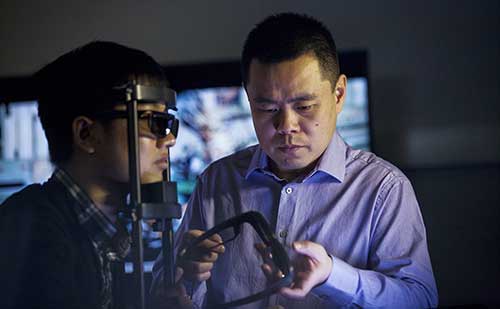
Waterloo researcher wins Engineering Emmy Award
Zhou Wang wins Emmy for developing technology that assesses video and image quality - affecting millions of viewers everyday

Zhou Wang wins Emmy for developing technology that assesses video and image quality - affecting millions of viewers everyday
By Staff Faculty of Engineering
Zhou Wang, a professor of electrical and computer engineering at University of Waterloo, has won an Engineering Emmy® Award for developing computational models that accurately and consistently predict how people view image and video quality, the Television Academy of Arts and Sciences has announced.
Wang, along with co-creators Eero Simoncelli, a professor at New York University, Alan Bovik, a professor at the University of Texas at Austin and Hamid Sheikh, a director at Samsung’s Mobile Processor Innovation Lab, will receive the award for outstanding achievement in engineering performance on October 28, at a ceremony held at the Loews Hollywood Hotel in Los Angeles, California.
The Engineering Emmy recognizes the team for its creation of Structural Similarity (SSIM), a mathematical formula and computer algorithm that is now widely used throughout the television industry.
Zhou co-founded SSIMWave Inc. , a Waterloo spinoff company that is leading the development of breakthrough technologies for the media and entertainment industry.
"SSIM is now a widely used perceptual video quality measure, used to test and refine video quality throughout the global cable and satellite TV industry, and directly affects the viewing experiences of tens of millions of viewers daily," the Television Academy said in announcing the award.
SSIM uses powerful neuroscience-based models of the human visual system to easily achieve highly accurate prediction performance, an issue that has long plagued the broadcast industry. Wang’s video quality measurement model is applied in real time on common processor software, bypassing previous models that relied on complex hardware and could not accurately report how humans actually perceived video and image quality. SSIM, in contrast, offers real-time assessments and allows production teams to immediately make changes to video or film to enhance the quality of their work.
Wang is well known for his leadership in the field of image processing and multimedia communications. Recently named to the Royal Society of Canada’s College of New Scholars, Artists and Scientists for his work in this field, Wang is one of the world’s most frequently cited authors in the field of image processing.
In a nod to the power of technology, Josh Brener of HBO’s Emmy-nominated Silicon Valley will host the ceremony.

Read more
Here are the people and events behind some of this year’s most compelling Waterloo stories

Read more
Meet the five exceptional graduate students taking the convocation stage as Class of 2024 valedictorians

Read more
The Government of Canada announces funding for discovery and applied research in engineering, natural sciences, health and social sciences
Read
Engineering stories
Visit
Waterloo Engineering home
Contact
Waterloo Engineering
The University of Waterloo acknowledges that much of our work takes place on the traditional territory of the Neutral, Anishinaabeg, and Haudenosaunee peoples. Our main campus is situated on the Haldimand Tract, the land granted to the Six Nations that includes six miles on each side of the Grand River. Our active work toward reconciliation takes place across our campuses through research, learning, teaching, and community building, and is co-ordinated within the Office of Indigenous Relations.